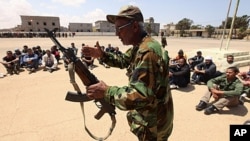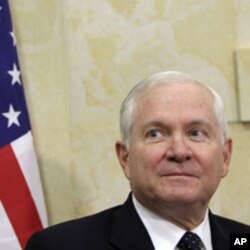Representatives from the Libyan opposition are in Washington this week to meet senior U.S. officials in a bid to win more foreign assistance to help topple Libyan leader Moammar Gadhafi. But the United States remains hesitant in providing more aid.
When Libya’s uprising began several months ago, there were calls for the United States to train the country’s lightly-armed rebels and supply them with weapons. But U.S. officials insisted that type of support should come from another country.
Since then, NATO has taken over enforcing the no-fly zone and arms embargo against Libyan leader Moammar Gadhafi, while some European countries have provided military advisers to the rebels.
And while the United States has pledged up to $25 million in so-called non-lethal assistance to Libya’s opposition and spent an estimated $750 million in the air war there, Washington remains hesitant to provide the rebels with more assistance.
On Thursday, U.S. Defense Secretary Robert Gates said the United States still is cautious in understanding who makes up the opposition.
“We have seen reports that there are some extremists that are fighting for the opposition. We see information, and we hear from the opposition that they are trying to isolate those people and get them out of the movement,” he said.
Gates was speaking to U.S. Marines at a military base in the eastern state of North Carolina.
In late March, media outlets reported that some Libyan rebels had admitted to fighting against coalition forces in Iraq and Afghanistan. At the time, a top NATO official said the alliance did not believe there was a significant connection between the Libyan opposition leadership and extremist groups.
Waheed Burshan represents the Libyan opposition. He is one of three representatives of Libya’s Transitional National Council visiting the United States this week for talks with senior U.S. officials.
While he admits that extremists may possibly exist outside the opposition leadership, he insists that they will not have a say in Libya’s future.
“Like any countries, we have people we don’t know of. But one thing that you need to be sure of is that our willingness [is] to make sure that none of these people exist among us or they be part of any system that we have,” he said.
Burshan says the opposition leadership has made clear that it solely wants, as he says, to “rebuild” Libya from four decades of Colonel Gadhafi’s autocratic rule.
He says his movement plans to do what it can to limit what he called any “fringe elements.” For instance, he says the opposition leadership plans to monitor closely the distribution of any weapons delivered from abroad in order to prevent instability within Libya, the region and elsewhere in the world.





